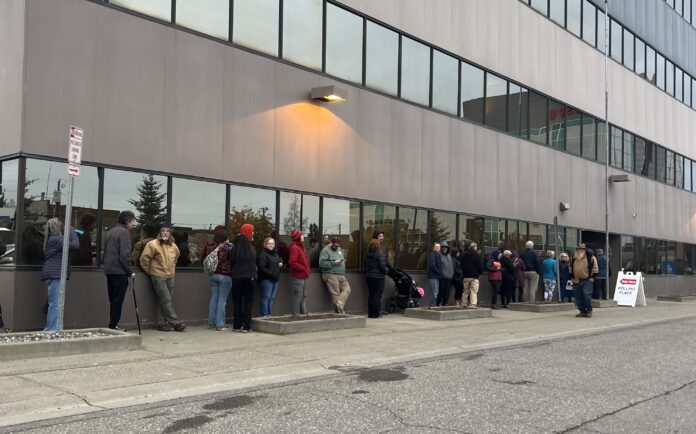A long-awaited comprehensive audit of Alaska’s election system reveals that while the state’s Division of Elections generally complies with state and federal laws, it has ongoing challenges in voter registration, election administration in rural areas, fraud response, and cybersecurity preparedness.
The audit was conducted by the Department of Administration’s Oversight and Review Unit at the request of former Lt. Gov. Kevin Meyer. It came after distrust developed over perceived flaws in the 2018 election. Election security advocates have been waiting for the release of the unredacted version of the report for years.
“Over the past five years, the Division of Elections has taken significant steps to address security and operational issues within the scope of its statutory authority, and key State systems and processes have undergone substantive changes to mitigate security concerns. Accordingly, a comprehensive review of the redactions took place this spring,” says a June 9 memo from Guy Bell, the public records officer in the Office of the Governor. “That review found that disclosing the redacted information would no longer raise security concerns and that waiving the privileges now would be less likely to have the adverse effects that were previously identified. For these reasons and because members of the public continue to request the unredacted report, an unredacted version of the report is being released.”
The report paints a mixed picture: Elections are effectively administered, but significant vulnerabilities and inefficiencies threaten public trust and operational integrity.
A major concern identified in the audit is the PFD Automatic Voter Registration law, which registers residents through their Permanent Fund dividend applications. While designed to improve access, the program has unintentionally registered ineligible individuals, including non-citizens and felons, and proved costly. In 2018, the state spent $1.5 million to register just 4,639 voters who actually cast ballots.
The PFD-AVR process has also introduced manual burdens. In 2017, the DOE had to manually process over 27,000 voter records, many with incorrect addresses, straining staff capacity and increasing the risk of error.
The Division of Elections has no formal policies or training in place for addressing voter fraud. Instead, staff rely on instinct and ad hoc judgment. This has led to inconsistent handling of issues like duplicate voting, including 23 cases in the 2018 primary and 54 in the general election, as well as cases of ineligible felons voting. Many of these cases were not fully investigated due to time constraints.
The report emphasizes the logistical and staffing challenges of conducting elections in Alaska’s remote communities. Election officials are hard to retain, and aging technology compounds problems. In 2018, TSX voting machines malfunctioned in multiple precincts, and 15 precincts reported unresolved issues, though only one was audited, due to narrow audit criteria.
Despite attempted interference in 2016 by Russian actors, the Division of Elections declined a free Risk and Vulnerability Assessment from the U.S. Department of Homeland Security, citing limited staff time. This occurred under the previous lieutenant governor, the late Byron Mallott.
Critically, the DOE operated its IT systems independently from the State Security Office (SSO), which reduced oversight. That has been corrected by the division. The agency also lacks a formal Election Security Preparedness Plan, though it has recently begun holding monthly meetings with the state’s Chief Information Security Officer, a move the audit deemed positive but insufficient.
Alaska’s current auditing procedures are also weak. Only precincts with optical scan voting and 5% or more of a district’s total votes are audited, leaving many discrepancies unexamined. The state does not yet use risk-limiting audits, considered best practice nationally, due to structural constraints—but the audit recommends adapting them to Alaska’s system.
The audit also reviewed lingering concerns from the 2010 Senate race between Joe Miller and Lisa Murkowski. While courts upheld the Division of Election’s actions at the time, the audit notes that current internal controls have since improved, mitigating risks of similar allegations.
The DOE has made several updates, including:
- Purchasing federally certified voting equipment for the 2020 elections.
- Adding reCAPTCHA protection to online voter tools.
- Creating a spoiled ballot log for improved tracking.
- Increasing election worker pay to attract more poll workers.
Among the audit’s 18 recommendations, several stand out:
- Implement signature comparison software to detect fraudulent ballots.
- Develop voter fraud policies and staff training programs.
- Create a sustainable process for maintaining accurate voter rolls.
- Recruit back-up election workers, especially in rural areas.
- Expand hand count verification beyond current limits (requires statutory changes).
- Repeal or amend PFD AVR, or introduce opt-out provisions.
- Conduct DHS security assessments and adopt NIST-based cybersecurity plans.
- Place DOE cybersecurity under Office of Information Technology (OIT) oversight and engage third-party providers for security enhancements.
- Secure voting machines locally to reduce shipping damage and cost.
According to Bell’s memo, 13 of the 18 recommendations have been completed. The other four require legislation, which was introduced by the governor but not passed by the Legislature.
Bell’s memo can be read here with the details on the improvements made:
The audit concludes that the Division of Elections is performing its duties under the law but is hampered by outdated technology, procedural gaps, PFD Automatic Voter Registration, and limited cybersecurity infrastructure. Some of the fixes will require legislative action.
The complete report is here:
